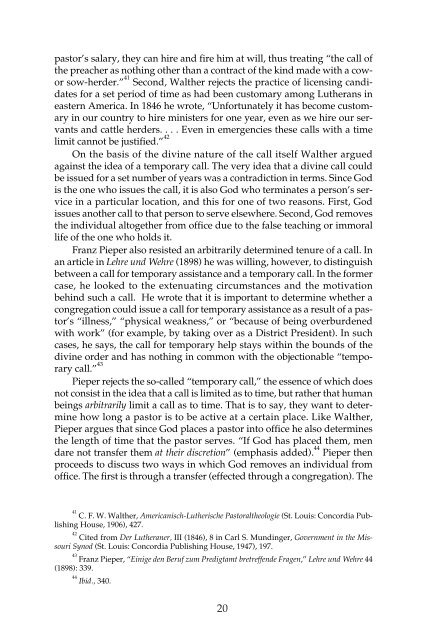45930 Divine Call CTCR final - The Lutheran Church—Missouri Synod
45930 Divine Call CTCR final - The Lutheran Church—Missouri Synod
45930 Divine Call CTCR final - The Lutheran Church—Missouri Synod
You also want an ePaper? Increase the reach of your titles
YUMPU automatically turns print PDFs into web optimized ePapers that Google loves.
pastor’s salary, they can hire and fire him at will, thus treating “the call of<br />
the preacher as nothing other than a contract of the kind made with a cowor<br />
sow-herder.” 41 Second, Walther rejects the practice of licensing candidates<br />
for a set period of time as had been customary among <strong>Lutheran</strong>s in<br />
eastern America. In 1846 he wrote, “Unfortunately it has become customary<br />
in our country to hire ministers for one year, even as we hire our servants<br />
and cattle herders. . . . Even in emergencies these calls with a time<br />
limit cannot be justified.” 42<br />
On the basis of the divine nature of the call itself Walther argued<br />
against the idea of a temporary call. <strong>The</strong> very idea that a divine call could<br />
be issued for a set number of years was a contradiction in terms. Since God<br />
is the one who issues the call, it is also God who terminates a person’s service<br />
in a particular location, and this for one of two reasons. First, God<br />
issues another call to that person to serve elsewhere. Second, God removes<br />
the individual altogether from office due to the false teaching or immoral<br />
life of the one who holds it.<br />
Franz Pieper also resisted an arbitrarily determined tenure of a call. In<br />
an article in Lehre und Wehre (1898) he was willing, however, to distinguish<br />
between a call for temporary assistance and a temporary call. In the former<br />
case, he looked to the extenuating circumstances and the motivation<br />
behind such a call. He wrote that it is important to determine whether a<br />
congregation could issue a call for temporary assistance as a result of a pastor’s<br />
“illness,” “physical weakness,” or “because of being overburdened<br />
with work” (for example, by taking over as a District President). In such<br />
cases, he says, the call for temporary help stays within the bounds of the<br />
divine order and has nothing in common with the objectionable “temporary<br />
call.” 43<br />
Pieper rejects the so-called “temporary call,” the essence of which does<br />
not consist in the idea that a call is limited as to time, but rather that human<br />
beings arbitrarily limit a call as to time. That is to say, they want to determine<br />
how long a pastor is to be active at a certain place. Like Walther,<br />
Pieper argues that since God places a pastor into office he also determines<br />
the length of time that the pastor serves. “If God has placed them, men<br />
dare not transfer them at their discretion” (emphasis added). 44 Pieper then<br />
proceeds to discuss two ways in which God removes an individual from<br />
office. <strong>The</strong> first is through a transfer (effected through a congregation). <strong>The</strong><br />
41<br />
C. F. W. Walther, Americanisch-Lutherische Pastoraltheologie (St. Louis: Concordia Publishing<br />
House, 1906), 427.<br />
42<br />
Cited from Der <strong>Lutheran</strong>er, III (1846), 8 in Carl S. Mundinger, Government in the Missouri<br />
<strong>Synod</strong> (St. Louis: Concordia Publishing House, 1947), 197.<br />
43<br />
Franz Pieper, “Einige den Beruf zum Predigtamt bretreffende Fragen,” Lehre und Wehre 44<br />
(1898): 339.<br />
44<br />
Ibid., 340.<br />
20


